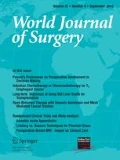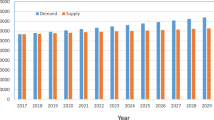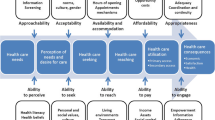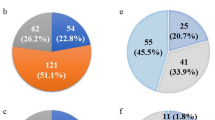Abstract
Background
Prior to 2003, production of new surgeons in Ghana was limited. In 2003, the Ghana College of Physicians and Surgeons (GCPS) initiated the first wholly in-country training and credentialing of surgeons. The purpose of this study was to assess the impact of in-country training of surgeons in Ghana.
Methods
We interviewed 117 (80%) of the 146 surgeons trained through the GCPS from inception through 2016. We gathered data on type of training, practice location, clinical workload, and administrative and teaching roles. Operations were categorized into those deemed essential (most cost-effective, highest population impact) by the World Bank’s Disease Control Priorities project versus other.
Results
In-country retention was 87–97%. A little more than half (56%) were working in the two largest cities and 44% were working in higher need areas. Twenty-two (19%) were the first surgeon to have worked at their current hospital. The surgeons performed a mean of 13 operations per week (seven electives, six emergencies). 35% of elective and 77% of emergency operations were in the essential category. Most (79%) surgeons were engaged in training/teaching; 46% were engaged in research; and 33% held an administrative office.
Conclusions
In-country surgical training has led to high retention and wide geographic distribution, including high need areas. The in-country trained surgeons are playing key roles in clinical practice, training, and administration. These data provide support for investments in similar efforts in other low- and middle-income countries.


Similar content being viewed by others
References
Anderson FWJ, Obed SA, Boothman EL et al (2014) The public health impact of training physicians to become obstetricians and gynecologists in Ghana. Am J Public Health 104(Suppl 1):S159–S165
Gyedu A, Abantanga F, Boakye G et al (2016) Barriers to essential surgical care experienced by women in the two northernmost regions of Ghana: a cross-sectional survey. BMC Womens Health 16:27
Stewart BT, Gyedu A, Abantanga F et al (2015) Barriers to essential surgical care in low- and middle-income countries: a pilot study of a comprehensive assessment tool in Ghana. World J Surg 39(11):2613–2621. https://doi.org/10.1007/s00268-015-3168-4
Gyedu A, Boakye G, Dally CK et al (2017) Assessment of barriers to essential surgical care in two communities in the upper west region, Ghana. J Health Care Poor Underserved 28(1):175–190
Ghana College of Physicians and Surgeons. Accra (2014). https://gcps.edu.gh/?page_id=3279. Accessed 1 Jan 2017
Gyedu A, Stewart B, Gaskill C et al (2017) Improving benchmarks for global surgery: nationwide enumeration of operations performed in Ghana. Ann Surg 268(2):282–288
The World Bank Group (2017) World Development Indicators. http://data.worldbank.org/indicator. Accessed 6 July 2017
Zakariah A, Degbotse D, Osei D et al (2014) Holistic assessment of the health sector programme of work 2013. Ghana Ministry of Health, Accra
Debas H, Donkor P, Gawande A et al (eds) (2015) Essential surgery. Disease control priorities, 3rd edn. World Bank, Washington, DC
Bradley EH, Curry LA, Devers KJ (2007) Qualitative data analysis for health services research: developing taxonomy, themes, and theory. Health Serv Res 42(4):1758–1772
Meara JG, Leather AJ, Hagander L et al (2015) Global surgery 2030: evidence and solutions for achieving health, welfare, and economic development. Lancet 386(9993):569–624
Myles PS, Haller G (2010) Global distribution of access to surgical services. Lancet 376(9746):1027–1028
Hutch A, Bekele A, O’Flynn E et al (2017) The brain drain myth: retention of specialist surgical graduates in East, Central and Southern Africa, 1974–2013. World J Surg 41(12):3046–3053. https://doi.org/10.1007/s00268-017-4307-x
Bolkan HA, van Duinen A, Waalewijn B et al (2017) Safety, productivity and predicted contribution of a surgical task-sharing programme in Sierra Leone. Br J Surg 104(10):1315–1326
Farmer PE, Kim JY (2008) Surgery and global health: a view from beyond the OR. World J Surg 32(4):533–536. https://doi.org/10.1007/s00268-008-9525-9
Gyedu A, Gaskill C, Boakye G et al (2017) Cost-effectiveness of a locally organized surgical outreach mission: making a case for strengthening local non-governmental organizations. World J Surg 41(12):3074–3082. https://doi.org/10.1007/s00268-017-4131-3
Ritchie WP Jr, Rhodes RS, Biester TW (1999) Work loads and practice patterns of general surgeons in the United States, 1995–1997: a report from the American Board of Surgery. Ann Surg 230(4):533–542 (Discussion 542–543)
Bolkan HA, Hagander L, von Schreeb J et al (2016) The surgical workforce and surgical provider productivity in Sierra Leone: a countrywide inventory. World J Surg 40(6):1344–1351. https://doi.org/10.1007/s00268-016-3417-1
Acknowledgements
The authors wish to thank all the surgeons who participated in the study. Because of the sensitive nature of the data collected for this study, requests to access the data set from qualified researchers trained in human subject confidentiality protocols may be sent to the corresponding author.
Funding
This study was funded in part by Grant D43TW007267 from the Fogarty International Center, US National Institutes of Health. The content is solely the responsibility of the authors and does not necessarily represent the official views of the National Institutes of Health.
Author information
Authors and Affiliations
Contributions
AG, SD, JP, CM was involved in study concept and design. AG, KA, SKG, PD was involved in acquisition, analysis, or interpretation of data. AG, SD. KA, SKG, JP, PD, CM drafted the manuscript. AG, SD. KA, SKG, JP, PD, CM critically revised the manuscript for important intellectual content. AG, SD. KA, SKG, JP, PD, CM was involved in administrative, technical, or material support.
Corresponding author
Ethics declarations
Conflict of interest
The authors declare that they have no conflict of interest.
Appendix: Survey tool
Appendix: Survey tool


Rights and permissions
About this article
Cite this article
Gyedu, A., Debrah, S., Agbedinu, K. et al. In-Country Training by the Ghana College of Physicians and Surgeons: An Initiative that has Aided Surgeon Retention and Distribution in Ghana. World J Surg 43, 723–735 (2019). https://doi.org/10.1007/s00268-018-4840-2
Published:
Issue Date:
DOI: https://doi.org/10.1007/s00268-018-4840-2




